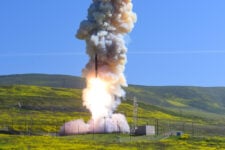UPDATE: Clarified Summary Of Maj. Gen. Rossi’s Remarks
WASHINGTON: Poor General Ray Odierno. While the Army Chief of Staff took pains this morning to have only kind words for the National Guard (watch the video clip), one of his subordinates’ statements about the Guard’s post-9/11 performance keeps causing angry ripples across the Internet.
Those ripples started spreading after I reported what Maj. Gen. John Rossi told me: that Guard brigades took too long to get trained and ready for the most tactically complex counterinsurgency missions in Afghanistan and Iraq. [CLARIFICATION: The original version of this sentence overstated Rossi’s point; see note below] Since we published Rossi’s remarks, our website and that of military satirist, cartoonist, and commentator Doctrine Man, who picked up the story, have been deluged with hundreds of comments pro and con. There are active-duty troops who feel relieved that someone has finally attacked a sacred cow, and there are Guard soldiers who feel personally insulted. Those comments include a fierce refutation by Maj. Gen. David Baldwin, no less a figure than the state commander of the California National Guard. Some highlights:
“[S]top lying about our potential, instead of defending an anachronistic Cold War construct of an expensive, large standing Army,” Baldwin wrote. “Don’t get me started about the disengenious [sic] narrative that Guard units never took on any tough jobs overseas. Who assigned those missions?”
“What terrifies Senior Army Leaders most in the past decades and today isn’t a resurgent Soviet/Russian Threat or The Dreaded Chinese,” Baldwin went on (the capital letters are his). “It is the very real risk that if the Congress figures out that the 80-Day or Less Major Conflict never has and never will happen and that Guard units can be ready to deploy for full spectrum combat ops by the time strategic lift is available, then there is no need for a large Active Component.”
Translated from militarese, Baldwin is saying that any major war will last long enough to call up the Guard, and most regular active-duty units won’t deploy any faster than the Guard anyway because there are too few Air Force and Navy transports (“strategic lift”) to carry them and their equipment. (Odierno reemphasized today the Army’s been working hard on making itself more deployable). So, Baldwin said, why do we need a big regular Army at all?
(You can read Maj. Gen. Baldwin’s full statement on Facebook — The California Guard confirmed these are his words).
An adjutant general like Baldwin reports to his state’s governor, not to the Pentagon, and has the freedom to make public statements no regular active-duty officer could get away with. The head of the Adjutants General Association of the United States (AGAUS), Kentucky Guard commander Maj. Gen. Ed Tonini, recently denounced the regular Army leadership himself on behalf of all 54 state and territorial adjutants-general.
But the problem with taking uncompromising public stands is that they make it much harder to find a compromise in private. That’s the unenviable task of Gen. Frank Grass, head of the Pentagon’s National Guard Bureau, the official intermediary between the states and the services.
“It introduces tension into the mix. How could it not?” one NGB source told me. “Gen. Grass has to sit next all of the Joint Chiefs all around the table, and he’s a team player.”
A Missouri Guard officer who sits on the Joint Chiefs of Staff with six active-duty four-stars, Grass has striven to downplay and defuse the conflict while working within the system.
Grass won at least a modest victory in the president’s 2015 budget request, which would reduce the Army National Guard by only 5.6 percent, from 355,000 soldiers today to 335,000 in 2017. That’s well above the 8.8 percent cut to 315,000 proposed by Odierno. True, the bigger Guard depends on a bigger budget than permitted by the current law, the Budget Control Act (aka sequestration), which is politically difficult to repeal. But it’s also politically significant the administration decided that those 20,000 Guard troops belonged in its proposed plus-ups beyond the BCA caps, along with such high-profile symbols of national power as an entire aircraft carrier.
As for the Army Chief of Staff, Gen. Odierno has been very careful with his words about the Guard of late, after months of emphasizing that regular active-duty brigades were more ready for rapid deployment and therefore not “interchangeable” with Guard ones. This morning, in Odierno’s first public question-and-answer session since the budget came out, the general said he only wanted the active and Guard components to get closer.
“We could not have executed what we’ve done over the last 10 or 12 years without using the whole army: US Army Reserves, active, and the National Guard,” Odierno told the audience at the Center for Strategic and International Studies. And in the future, he said, “it becomes even more important, because as the active component gets smaller, it’s going to require us to rely even more on the Guard and Reserve.”
“We have to set up a command structure that allows us to be much more integrated during peacetime,” Odierno said. Citing recently issued Army guidance, the Chief of Staff predicted we would soon see regulars, Guardsmen, and reservists training more frequently together, reporting to the same commanders, even working side by side in “multi-compo” units.
“We continue to build on the strength of the relationships we’ve built over the last 10 or 12 years,” Odierno said. “I think that’s key as we move forward.”
The question now is whether rhetorical and budgetary battles between regular and Guard generals will make it harder for their subordinates to work together in real wars.
[A clarification and an apology: The original version of this story said Maj. Gen. Rossi told me that Guard brigades “couldn’t handle” certain missions. That overstates his case and does him a disservice. Rossi did not say that Guard units could never do such missions, only that their lower readiness compared to active-duty units meant that it took much longer to get them fully trained and ready to do so, a problem which meant they were normally assigned missions that were tactically simpler (but no less deadly or demanding for their soldiers). Maj. Gen. Rossi took great care with his words and I should have taken more care with mine. (Click here for our full story on the interview with Rossi, which does do justice to the nuances of his argument). We’ve revised the offending sentence.]
Move over FARA: General Atomics pitching new Gray Eagle version for armed scout mission
General Atomics will also showcase its Mojave demonstrator for the first time during the Army Aviation Association of America conference in Denver, a company spokesman said.


























